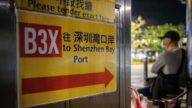【新唐人2012年9月20日讯】由于中国各地的反日活动中,出现打、砸、抢日资商店和焚烧日本汽车的现象,9月18号和19号,数家日本企业暂时关闭了在华的零售店和工厂。同时,中共媒体连续发表文章,建议就算“伤敌一千、自损八百”也要对日本实施经济制裁。但经济专家指出,一旦中日之间爆发经济战,将没有真正的赢家。
18号,日本超市业者“永旺 (Aeon) ”已将中国大陆的35家店铺,关闭了30家。另外,便利商店“7-11 (seven eleven) ”198家店铺休业﹔而服装零售商Fast Retailing关闭了60家优衣库(Uniqlo)店面,并要求200名日本员工在家待命。青岛被纵火的丰田汽车和本田汽车,18、19号暂停了部分中国工厂的运作。还有,马自达,三菱汽车,松下等等知名日本企业,都暂停了部分在华工厂的生产。
同时,中共媒体建议对日本实施经济制裁。
《人民日报》海外版,17号发表文章:“中国何时对日扣动经济扳机”,同一天,中共主要英文报纸《中国日报》(China Daily)也发表了“应考虑制裁日本(Consider Sanctions on Japan)”的文章。
日企相继关厂后,《央视》以及各地方《卫视》纷纷录制节目,邀请专家评论“中日开打经济战”对两国的影响,而各专家一致表示,经济制裁对日本的打击是致命的,并且对中国影响不大。
美国《华尔街日报》指出,中国对日本实施经济制裁后,双方谁受的打击会更沉重?这个问题还存在争议,但中日都将受到影响,这一点毋庸置疑。中国一直严重依赖日本的投资资本和技术,而且日本是中国第三大出口市场,仅次于美国和欧盟。
经济专栏作家、北京师范大学MBA导师段绍译:“抵制日货会让日本产品在中国销量递减,影响日本的就业、出口、GDP,也同样会影响中国的…中国的百姓生活水准下降,国民收入下降。因为这个贸易是双赢的,只要没有勉强的自由贸易都是双赢的。一方得到好处,另一方也得到好处,所以抵制日货实际上是一个损人损己的行为。”
时事评论员陈志飞指出,从中长期看,中日经济一旦开战,将给中国的投资环境造成负面形象。
时事评论员陈志飞:“这个虽然说是一个政治事件,但是从经济发展角度来看,投资环境其实最首要表现在政治体制的稳定,和法律制度的健全。政府现在放任民间这样做,是有它的政治目地,但是从中长期来看,会伤害日本厂家在中国的利益,也会损害中国的长远经济发展。”
英国《金融时报》中文网“投资与财富管理”编辑冯涛撰文指出,中日一旦发生经贸对峙、互打经济牌,暂且不说谁输谁赢,正所谓“伤敌一千、自损八百”,到最后这场“战役”将没有真正的胜利者。
虽然《人民日报》的文章认为,中国有“伤敌一千、自损八百”的意志和承受力。但是这次“佳能”停工两天,已经造成2万2千名员工“带薪休假”。一旦,各大日本企业真的从中国撤厂,可以想见,大量失业的中国员工,将给中国社会带来多沉重的压力!
采访/朱智善 编辑/尚燕 后制/君卓
Is It Worthwhile to “Hurt 1000 Enemies at the Expense of 800”?
As China’s anti-Japan activities turn ugly and violent,
several Japanese owned plants and stores temporarily shut down on September 18 and 19. State media consequently suggested to impose economic sanctions on Japan even if “it hurt 1000 enemies at the expense of 800″.
However, the economist indicates that an economic war will end up with no winner.
On the 18th, the Japanese retailer Aeon shut down 30 of its 35 stores in mainland China. In addition, 198 “7-11″convenience stores were closed; clothing retailer Fast Retailing closed 60
of its Uniqlo stores and held its 200 Japanese employees on standby at home. Both Toyota and Honda, victims of arson in Qingdao, suspended the operation of some of the Chinese factories. Mazda, Mitsubishi Motors, and Panasonic have also suspended manufacturing in some factories in China.
Meanwhile, the CCP mouthpiece suggested imposing economic sanctions against Japan.
On the 17th, while overseas editions of People’s Daily wrote, “When will China pull the economic trigger towards Japan", CCP’s main English-language newspaper, China Daily, also published the article, “Consider Sanctions on Japan".
Following Japanese companies shutting-down, CCTV and each local TV station produced programs with experts discussing the impact of “the Sino-Japanese economic war." All experts agreed that the economic sanctions on Japan will be a fatal blow for Japan and have little impact on China.
As The Wall Street Journal pointed out, “It’s arguable who would be hit worse. Both economies would suffer for sure. China has relied heavily on Japanese investment capital and technology and Japan is a key export market, its third largest after the U.S. and E.U."
Ref. to polisher: http://blogs.wsj.com/chinarealtime/2012/09/17/whats-at-stake-in-china-japan-spat-345-billion-to-start/
Economic columnist, also a visiting scholar of the MBA program of Beijing Normal University, Duan Shaoyi: 0-0:24 Boycotting Japanese goods will reduce the sales of Japanese products in China, affect employment, exports, and GDP of Japan; It will also affect China such as lower the living standards and people’s income. Free trading, without forcing it, is a win-win situation. Both parties benefit from it.
Boycott Japanese goods will only hurt others
at the expense of one-self.
Commentator Chen Zhifei indicates that in the medium and long term, the Sino-Japanese economic war will lead to a negative image of China’s investment environment.
Current affairs commentator Chen Zhifei: It is a political issue. However, on economic development, investment relies on political stability and a
sound legal system. The government purposely allows the situation to continue this way.
But in the medium and long term, it will hurt the Japanese manufacturers in China, and damage the long-term economic development of China."
Feng Tao, editor of The Chinese Financial Times, stated that with the Sino-Japan trade and economic confrontation, regardless who will win, it is the so-called “Hurt 1000 enemies at the expense of 800″. There will not be a real winner at the end of this “battle".
People’s Daily believed that China has the will and endurance to"Hurt 1000 enemies at the expense of 800″. But when Canon suspended production for two days, 22,000 employees were on “paid leave". If these Japanese companies withdraw from China, heavy pressure of unemployment for
the Chinese society is foreseeable!
采访/朱智善 编辑/尚燕 后制/






















